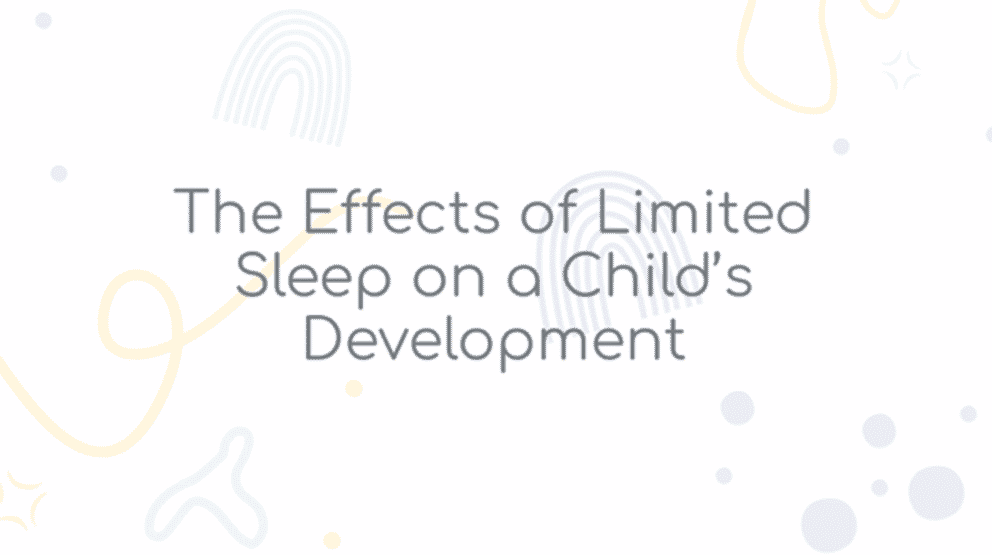
The Effects of Limited Sleep on a Child’s Development
Every parent knows just how irritable, emotional and just plain over-tired their child becomes if they do not get an optimum amount of sleep, but have you ever stopped to wonder what effects this has on their development?
The answer is, a pretty detrimental one. All aspects of their well-being are compromised – physically, emotionally and socially.
Read on to learn about the most harmful consequences of sleep deprivation on your little one, and how to combat them:
Physical Health Issues
Sleep loss makes infants more susceptible to allergies, ear infections, and hearing problems. The most serious conditions include high blood pressure, heart disease, stroke and irregular heartbeat. It may also affect their response to vaccinations such as flu jabs.
Disturbed sleep impinges on the motor skills of children, leading to them being more accident-prone. An over tired child is essentially ‘an accident waiting to happen.’ Injuries on bicycles and accidents on playground equipment are more likely to occur when a child is sleep-deprived.
Research has discovered that sleep loss is linked to obesity; a lack of sleep has an adverse effect on the hormones that control and regulate hunger, boosting appetite and a child’s preference for high-calorie, high-carb foods. Therefore, inadequate amounts of sleep may cause a child to overeat.
Additionally, your child’s risk of diabetes is heightened, as disturbed sleep patterns can affect the body’s ability to metabolize sugar and trigger insulin resistance, a widely recognised factor for diabetes. Over the past few years, doctors have witnessed a dramatic rise in childhood obesity as well as Type 2 diabetes (the non-insulin dependent form of the disease).
Sleep loss may hinder the physical development of your child. Growth hormone is released into the bloodstream during the rem cycle and as lack of sleep results in a decrease in its release, height and growth of an infant may be adversely affected.
Natural immune-boosting substances are released as we rest; poor sleep over a prolonged period will lower a child’s immunity and ability to fight off infections.
Emotional and Behavioural Issues
Without a stable sleep pattern your child could experience the following:
· When your child owes their mind and body sleep, it is called sleep debt. A huge sleep debt, where they are deprived of an optimum amount of sleep for several consecutive nights, can leave your child feeling mentally exhausted. It will also worsen the symptoms of any existing negative behaviour.
· Tearful or sensitive, more so than usual
· Prone to tantrums and moodiness
· Impulsive behaviour that may be out of character
· Child seems stressed out throughout the day
· Not following your instructions or adhering to set boundaries
Mental Health Issues
For older children, sleep loss has links to anxiety and depression. Insomnia contributes to these two conditions and plays a role in anxiety by raising cortisol, the stress hormone. It has long been accepted by scientists that depression and anxiety can contribute to insomnia; however, recent research has shown that insomnia often precedes the first depressive episode.
The effects of lack of sleep are actually felt within a child’s sub-conscious during the night; they experience sleep terrors, bedwetting, nightmares and even sleepwalking at an above average level.
Academic and Cognitive Performance at School or Nursery
All of our brains, but especially your child’s, need sleep to replenish the resources and energy they expend during the daytime. A well-rested brain problem solves, learns and retains new information and is able to function during the day much more effectively than a tired brain.
Children who do not enjoy a night of quality sleep:
- are less creative
- have less concentration to focus on tasks and for shorter periods of time
- have worse problem-solving abilities
- are not as capable of making positive decisions
- suffer from increased forgetfulness and blurred vision
- are less able to learn and retain new information
- experience a loss of energy during the day
- impaired capacity to maintain good relations with classmates
How You Can Help Your Child
Here are some top tips on how to improve your child’s sleep habits:
Electronic Devices and Social Media
- Switch off all devices such as ipads, computers and social media an hour before bedtime
- Keep these devices outside your child’s bedrooms overnight
- Switch on the non-blue light “night mode” at dinner
- Leave the same devices switched off until after breakfast time
Social media poses unique risks, as opposed to screens in general, due to its overbearing influence on the reward centres of the brain.
- When children are watching social media content, their brains are secreting chemicals like dopamine which stimulate the ‘waking centres’ of the brain and make it harder to fall asleep.”
- Social media signals the adrenal glands to secrete adrenaline and the stress hormone, cortisol, and as all parents can testify, your child experiencing a surge in adrenaline and cortisol when you want them to fall sound asleep is a worse-case scenario of epic proportions!
- Balanced nutrition at every mealtime will keep blood sugar levels steady and prevent a surge and crash that makes sleep irregular
- Ensure you implement an evening routine and stick to it – dinner, bath and brush teeth, story and then bed will get your child accustomed to winding down for the evening
- Frame bedtime as a positive thing: ‘Going to bed now means you’ll have lots of energy to have fun tomorrow’
- If your child is anxious or a worrier, ask them to write down anything that is bothering them, early in the evening, and then put the piece of paper away in a drawer. This will give them the chance to offload and prevent them worrying in bed later when they should be sleeping
- Avoid using going to bed early as a punishment or staying up late as a reward
- Don’t utilise the bedroom for timeouts or the naughty step
- Adjust the sleep environment for your child. They need a quiet and dark bedroom with a soft comfortable mattress and pillows just as much as adults do, if not more.
We hope this article has helped you understand how important it is for your lovelies to get consistent, good quality rest and the best ways to achieve this goal.
One last tip – invest in a HappySkin sleepsuit or pyjama set so that your child will be able to enjoy a scratch free and peaceful night’s sleep in dreamland in no time!







